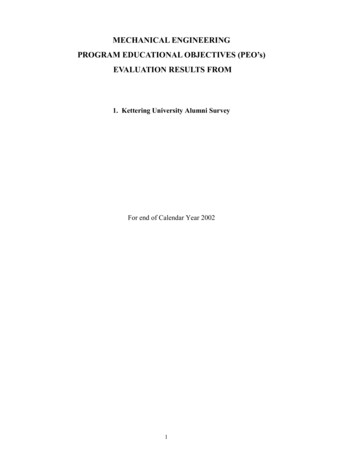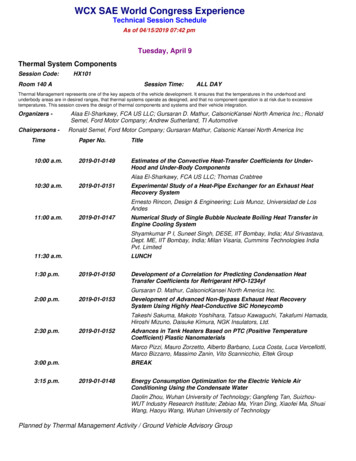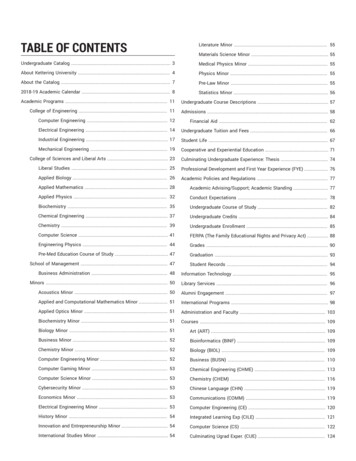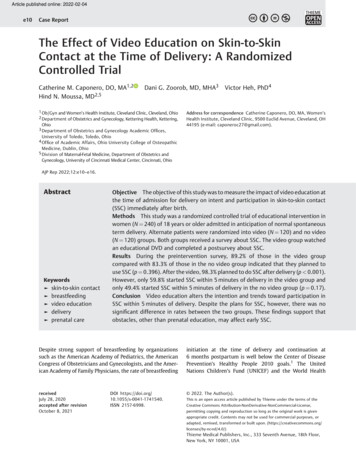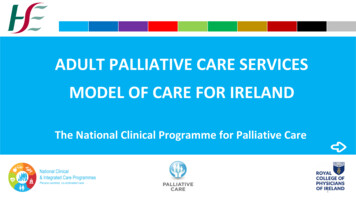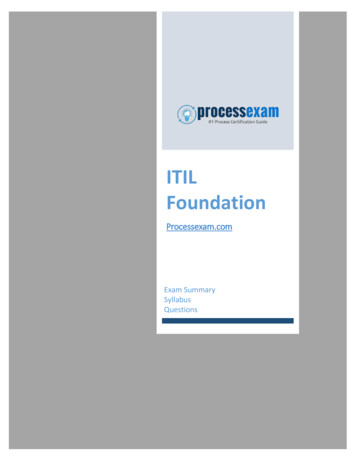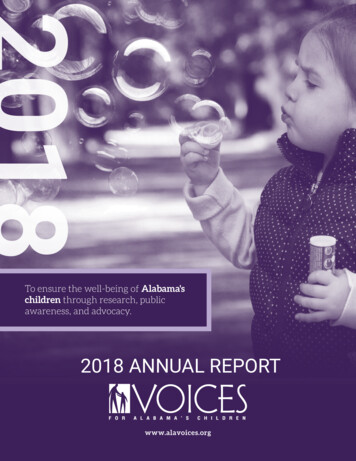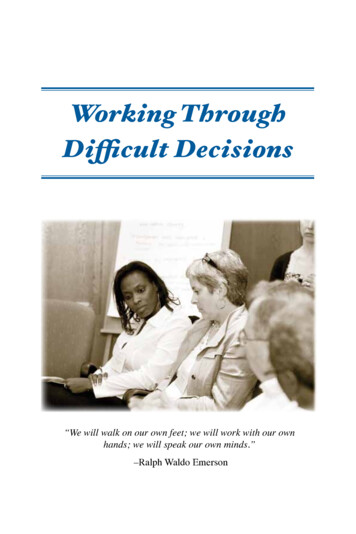
Transcription
Working ThroughDifficult Decisions“We will walk on our own feet; we will work with our ownhands; we will speak our own minds.”–Ralph Waldo Emerson
Many people would like a stronger hand in shaping their collectivefuture, and that requires making choices about what they want that future to be. This brochure is written for these citizens—citizens interestedin joining with others to do something about critical issues facing theircommunity, their country, or both. Standing in the way are the inevitabledisagreements over what should be done. Citizens may recognize that whatis happening to them isn’t good, yet not agree about what would be better.They may even disagree about the nature of the issue that is confronting them. And they may or may not make decisions that are in their bestinterests.If people are going to master these challenges and act together wisely,they need to be able to make sound decisions together. This is not a how-toguide, but it does provide insights into the kind of decision making thatleads to effective collective action and helps turn first impressions andhasty conclusions into a more shared and reflective public voice.The Kettering Foundation has found that sound decisions are morelikely to be made when people weigh—carefully and fairly—all of theiroptions for acting on problems against what they consider most valuablefor their collective well-being. This is deliberative decision making. It notonly takes into consideration facts but also recognizes the less tangiblethings that people value, such as their safety and their freedom to act.People regularly do this type of decision making with those that theysee every day. They discuss community events and policy issues over work
breaks, at the grocery store, and at the lunch counter. The research that thefoundation is presenting here is drawn from these self-selected gatherings.It was done this way in order to supplement studies of opinions based onpolls and focus groups. The objective is to account for how people ordinarily go about making up their minds.You Can Do ItThere are many books on facilitating small group meetings, and thatinformation is not repeated here. Unquestionably, all meetings go betterwhen everyone is encouraged to speak, no one dominates, and participantslisten respectfully. Productive conversations usually begin by agreeing tothese ground rules. Those moderating or facilitating meetings have to keepthe discussion on track and move the conversation along when a topic hasbeen exhausted.Public deliberation, however, is distinctive; both the individual organizing the meetings and the participants have responsibilities. The key toeffective deliberation is for everyone involved to be aware of the workthat has to be done and expect to contribute to doing it. So deliberativedecision making begins by recognizing what has to be decided and not justdiscussed.In presenting its research on deliberative decision making, the foundation has learned that too much information can discourage people fromconducting forums. Deliberation seems like neurosurgery or somethingonly an outsider can do. Kettering is trying to correct that impression without going to the opposite extreme by suggesting that collective decisionmaking is easy or that practice can’t help people become more proficient atit. (Other foundation publications can provide more information on deliberative decision making and its role in democracy.)If this is the first time you are involved in deliberative decision making, you might keep in mind what you know from personal experienceabout making good decisions. In choosing a career, for example, we haveto weigh various options against what we think is most valuable, and weoften have to accept difficult trade-offs. While weighing different options carefully and fairly in a public setting is difficult work (what we callchoice work), it is a natural act, not a skill only possessed by experts. Infact, people around the world have made difficult decisions together sincethe dawn of recorded history. In the United States, collective decisionmaking has a rich history: it began in tribal councils and colonial townmeetings.
Getting StartedThe most important things to keep in mind in any kind of work arewhat has to be done and what is required to do it. There are three keys todoing choice work—assuming that those involved in the decision makinghave agreed to work toward a decision. The experiences and concerns of all participants have to be recognized. Deliberations can follow from a simple question: howhas this affected us and our families? The stories that individualstell enrich people’s understanding of the problem they face, aswell as their understanding of those who need to be enlisted inorder to solve the problem. Trade-offs have to be identified, and those that are and aren’t acceptable have to be sorted out. Anything we would like to do tosolve a problem will have benefits as well as costs or downsidesthat we may not like. We have to face up to these tensions. All options must get a “fair trial”; unpopular views need to havetheir “day in court.”Sometimes deliberative decision making is demonstrated in speciallydesigned forums. Those using the National Issues Forums (NIF) issuebooks to jump-start public deliberations have three or four options for action laid out to structure the conversation. The description of each optionlists some ofthe advantagesand disadvantages to beconsidered.Seeing thatthere is morethan oneoption andthat each hasconsequencesthat may beunacceptablehelps move the conversation beyond the highly partisan, bipolar framingthat dominates much of today’s political discourse.
The ideal conversation in a forum sounds very much like what goes onin the best of everyday decision making. The questions being discussed areusually along these lines: What’s happening? What are we up against? How are we affected? How are others affected? What do we think we should do? If we did what has been suggested, do you think there might beany downsides? If there were, should we still do what has been proposed?Research drawn from thousands of NIF forums for more than 25 yearsidentifies 3 obstacles that can block this conversation. The most obvious is whenthe personpresiding at aforum doesn’tmaintain judicial neutrality and triesto influencethe decision.The secondis when theconvenor takesa laissez-faireapproach andloses focuson the workto be done.The third andmost commonpitfall is when the person organizing the forum or a few participants intervene so often that they disrupt the person-to-person exchange of storiesand opinions that makes public deliberation work.The foundation has also seen forums that are so intent on covering alloptions fully, with equal time for each one, that participants may missthe point. They don’t get to experience the interpersonal interaction thatproduces deliberation. Even though it is desirable to consider every option, it is more important that forum participants are able to distinguish
deliberation from other types of policy discussion. That is what forumsdemonstrate so that participants can bring deliberative qualities to otherdecision-making venues. No one forum of a few hours can provide enoughtime to make a sound decision on a difficult issue, but it can establish aprecedent or introduce a different way of making decisions for civic organizations, legislative bodies, school boards, or other groups where collective decisions have to be made.How Deliberative Decision Making WorksTo repeat: deliberative decision making is weighing various optionsfor action or policy against what we think is most valuable in a given situation. This kind of decision making recognizes that we differ about whatshould be most important to accomplish. Unfortunately, the importance ofthe things we hold dear is not always acknowledged, and people may tryto make decisions by debating facts alone. Facts are essential, yet they areoften used as surrogates for the less tangible things we value. People battleover facts when their differences are over what should be. Consequently,they never deal with the real source of their disagreements; these remain inthe background, only to reemerge later.Agreeing and Disagreeing at the Same Time: Although deliberative decision making takes into account what people value, as well as thefacts, it is not a debate over values or an exercise in selecting some thingsof importance and disregarding others.In presenting its research, the foundation has learned to stop at thispoint and explain what is meant by phrases like “the things people value,”“hold dear,” or “consider deeply important.” These refer to things that areessential to our collective well-being. Being secure from danger and beingtreated fairly by others are some examples. We all tend to agree about theimportance of such things. What human being doesn’t value being secure?We have our own ideas about what should be done to solve our problems because our experiences aren’t the same. This causes us to assess thesituation we are in differently when we try to make a decision. What oneperson thinks is most valuable to achieve in a given circumstance isn’tthe same as what another thinks is most important, not because they don’tcare about the same things, but because conditions affect them in differentways. The result is that some of us will accept trade-offs that others won’t.In other words, even though we agree on the things that are most valuable,we also disagree. Still, recognizing that we have both common concerns aswell as differences of opinion on the circumstances facing us can change
the tone of our decision making. People in a forum may be more likely toagree to disagree.Dealing with TensionsAlthough recognizing that we both agree and disagree may temper animosities, there is no escaping the pull and tug people feel when confrontedwith having to make difficult trade-offs. As noted, any action we mighttake to solve a problem will inevitably favor some of the things we careabout more than others. For example, on economic issues like promotinggrowth, which could help provide the jobs we want, we have to take intoconsideration the downsides of growth, such as urban sprawl and environmental damage.Becoming aware of these tensions can bring emotions to the surface.Deliberation provides a means to work through these feelings, not to theextent that they disappear, but to the degree that we can get on with thebusiness of weighing all the options. Weighing each option fairly andrecognizing the range of concerns at stake gives people confidence thattheir point of view will get a fair trial. Furthermore, our differences are lesslikely to be polarizing when we realize that the tensions are within each ofus, as well as among us.These are some of the reasons that NIF forums have seldom, if ever,been plagued by disruptive behavior. Recognizing tensions doesn’t seemto create the problems some forum organizers fear. While people dislikecontroversy, many in the NIF deliberations have said that they welcomedopportunities to talk about hot topics frankly because they could exchange
opinions without being personally attacked. Forum participants have givenhigh marks to meetings where they could express strong views withoutothers contesting their right to their beliefs.The Role of Public Deliberation inProblem SolvingCertain problems are particularly difficult to solve because they comefrom many sources, so no one institution or group of citizens can remedythe problems alone. This is a situation in which public deliberation is needed to fosterbroad-scalepublic action.The first decision citizenshave to makein these casesis whether ornot to have aforum. If thedecision is toproceed, youmay find thatparticipantsin your forumare initiallyspending a good deal of time determining exactly what the problem is. Thenature of the issue is the issue. Making decisions together begins with, andcontinuously involves, naming problems in a way that captures the thingspeople hold dear.Naming, or describing, a problem is critical because the name influences what follows, even the solution that is selected. Deliberative decisionmaking is part of acting, not something prior and separate. Deliberationdoesn’t lead to action; it is integral to action. And that is why an effectiveforum has to be focused on working toward a decision about action; citizens quickly lose interest in talk just for talk’s sake.Since particularly persistent problems require action by numerous actors, citizens can’t just settle on one name for a problem. While we valuethe same things because they are essential to our well-being, we hold morethan one thing dear. For instance, we want to be secure and to be treated
fairly. So the way people come to see problems as they deliberate tends tobe broad and inclusive rather than narrow. This allows for multiple actionsby different actors rather than one solution that everyone must support.Another reason deliberation fosters what scholars have called an “enlarged mentality” has to do with the way participants get beyond their ownexperiences. Caught in the dilemma of having to make difficult choices,people are prone to be less certain—even about the options they favor. Despite the tendency to seek out the like-minded when looking for affirmation of our opinions, when uncertain, we become curious about how othershave been affected by a problem or what they have done to solve it. Weopen ourselves to experiences other than our own.This opening is a key ingredient in problem solving. First, the experiences of others allow us to see a problem more fully; and second, we maycome to see others in a different light. These insights allow us to find newapproaches to problems that were obscured by narrow definitions. Andwe come to see potential actors and resources that we didn’t recognizebecause they, too, were obscured by the way the problem was defined. Theimplication for what has to happen in a forum is that interaction amongparticipants is essential.Moving in Stages: Insights about the nature of our problems andthe people around us don’t come quickly, and Kettering’s findings assumethat deliberation has occurred in more than one meeting. Recognizing andworking through tensions takes time because people’s thinking moves instages.In your forum, you may find participants at different points. Initially,citizens may be unsure whether a problem is serious and, if it is, whetherthey can do anything about it. That is what they will want to deliberateabout. Later, if they have decided that a problem is real and urgent, peoplemay try to find someone to blame or they may look for an easy solution.It may be some time before they identify options for action and face upto possible disadvantages of options they favor. For example, is climatechange really a problem? They may be uncertain. Then, if convinced thatthere is a danger, they might be prone to look for someone or something toblame and deny their responsibility. (Government waste, fraud, and abuseis a common scapegoat.) Or they may latch onto something that they hopewill save us and remove the necessity for accepting painful trade-offs.(Science and technology are often seen as saviors.) If finally convincedthat blaming others isn’t getting them anywhere and that someone or
something else isn’t going to provide painless solutions, they may settledown to confronting the trade-offs they have to make and working throughthe strong emotions that well up when having to make sacrifices. Eventually, they can reach a point at which they are reconciled to what has to bedone, and they can move ahead. Depending on the issue, the public maybe at any one of these stages. By deliberating, however, citizens can movealong to the next stage and not get stuck.Results: While public deliberation can change the tone of decisionmaking, you shouldn’t expect it to result in total agreement. The foundation once described the goal of a deliberative forum as “common groundfor action,” but this was often understood as “common ground,” implyingunanimous consensus. Because we never found that unanimity, we had tochange our terminology. What forums are good at locating is the terrainbetween full accord and polarized conflict; it is ground that is more sharedthan common—large enough for most everyone to stand on and still maintain differences. Participants in deliberation have been able to settle on ageneral direction or broad purpose to guide their actions, which may bemany and varied, yet coherent.Public deliberation is not a cure-all for every problem, but by helpingpeople make sound decisions, it helps generate the power to act wisely.And this enables citizens to come closer to making the difference theywould like to make in a democracy. Deliberation also helps integrateindividual voices into a more coherent and nuanced, though not uniform,public voice, one that can explain how the citizenry goes about making upits mind.
Professional associations and legislative bodies benefit from hearingthis voice. It tells them how to engage with citizens as they attempt to explain the policies they favor. Government agencies have also used publicdeliberations to defuse potentially polarizing issues. And NIF issue bookshave been used in educational settings to introduce students to one of themost basic roles citizens play—making decisions with others on issues thataffect their future. Young people learn a form of democracy they can useevery day.For communities, one of the most important effects of deliberativedecision making is to put the community in a learning mode. The ancientGreeks referred to this as “the talk we use to teach ourselves before weact.” This sort of learning is the key to experimentation, innovation, andenterprise. And communities that are learning are usually able to keep upthe momentum for change despite setbacks because they know how to failsuccessfully: they learn from their experiences to plan a new round of civicinitiatives.Deliberative decision making also builds a political culture that isfocused on problem solving rather than adversarial combat between partisans. In addition, the people participating in the deliberations bring adistinctive type of leadership to their communities. This is leadership forexpanding civic capacity, for enhancing the ability of citizens to cometogether as a community to do the work only citizens can do. It is a leadership that draws out and validates the innate powers of people actingtogether, building on what is already growing. It is a leadership for civiclearning. And it is a leadership that anyone can exercise, a leadership thatcan help make communities become leaderful.For more information on public deliberation, see these three Kettering Foundation publications: We Have to Choose: Democracy andDeliberative Politics, which elaborates on much of what is covered inthis brochure; Public Deliberation in Democracy, which clarifies thetype of deliberation the foundation studies and deals with commonmisconceptions of public deliberation, such as the perception that itis a special methodology only used in forums; and Kettering’s newreport on naming and framing issues for deliberation, Naming andFraming Difficult Issues to Make Sound Decisions. For more information on National Issues Forums, visit www.nifi.org.
www.kettering.org200 Commons Rd.Dayton OH 45459800-221-3657FAX 937-439-98046 East 39th St.9th FloorNew York NY 10016212-686-7016FAX 212-889-3461444 North Capitol St., NWSuite 434Washington DC 20001202-393-4478FAX 202-393-7644
the tone of our decision making. People in a forum may be more likely to agree to disagree. DealInG wItH tenSIonS Although recognizing that we both agree and disagree may temper ani-mosities, there is no escaping the pull and tug people feel when confronted with having to make difficult trade-offs. As noted, any action we might
